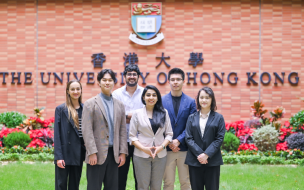Not only does China have the world’s second-largest economy, but it’s also home to financial and economic epicenters such as Shanghai and Beijing.
Studying an MBA in China paves the way for international business opportunities. 90% of MBA graduates from Chinese universities found employment in the business sector within 3 months of graduating, according to China Admissions.com.
Access to a successful alumni network is also a great way to get your foot in the door and break into the myriad of local and multinational industries across Asia.
An MBA in China means benefiting from a diverse curriculum
The Sino-international MBA (SiMBA) at School of Management (SoM), Jinan University (JNU) is one of the few full-time MBA programs taught in English in South China. Located in Guangzhou, one of China’s largest seaports and key export centers, students can gain access to opportunities within Guangzhou’s diverse job market.
The program not only provides students with insight into Chinese business and management practices—critical if you’re interested in pursuing a career in China—but it also has a strong international focus.
This means that you will leave the course feeling prepared for a global career while gaining an understanding of important aspects of Chinese culture that will help boost your career prospects in China, believes Wenjing LI, dean of SoM.
“The SiMBA equips students not only with an insight into China’s business and management practices and its unique culture, but also an international vision, enabling them to develop their careers in China or beyond,” says Wenjing LI.
He notes that the Jinan University MBA program benefits international students, Chinese business elites across the world, and expatriates interested in pursuing a career in China.
A global MBA can help student build connections with an international network
Wenjing LI believes a key differentiator for the SiMBA is the school’s mission to expand among international markets and provide learners with a diverse learning experience.
The two-year, full-time program enables students to benefit from an international faculty, diverse project management staff, and cooperate with prestigious institutions abroad.
The School aims to maintain its global reach by building its network with international business schools through exchanges with the SiMBA program. Since its establishment, the School has maintained collaborative programs with several leading international educational institutions from across Europe and Asia, including Nagoya University of Commerce & Business in Japan and Lyon Business School and EDC Paris Business School in France.
“Through guidance from and interaction with alumni mentors, SiMBA students can build and expand their interpersonal network, learn from experience, and grow as professionals,” Wenjing LI adds.
The SiMBA program at Jinan University typically attracts a cohort of students from a range of nationalities.
Wenjing LI points out that some of these students might find studying an MBA in China challenging, and that students might feel intimidated by the prospect of adapting to a completely new learning environment and culture.
To navigate these potential challenges, MBA students are encouraged to work closely with one another.
Exposure to a diverse cohort is a fantastic way for students to independently build an international network, believes the dean.
Immersing yourself in a diverse MBA cohort and a new culture can help you learn and build upon your own cultural awareness. This, paired with the networking opportunities and overall skill set you’ll gain from studying a global MBA program, are crucial tools that can help grads launch an international business career.








